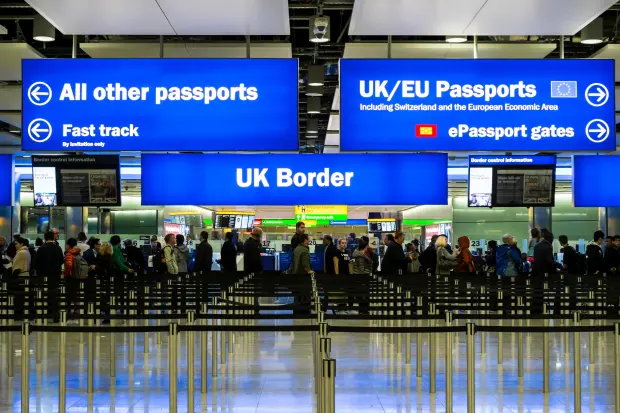Britons stand to postpone trips to EU countries to avoid travel chaos when the new European Union border system (EES) is introduced later this year, INews reports.
The automated system for non-EU nationals to register when they cross the EU’s external border is expected to come into effect in October. The innovation will require non-EU travellers to undergo facial scans and register their fingerprints.
Travellers have been warned to stock up on extra time to beat the extra queues and remember that their insurance may not cover losses due to border delays.
One travel expert who spoke to i even advised British travellers to postpone EU trips for at least two weeks after the system comes into force. This comes after the Eurostar boss told the BBC that the app, designed to make it easier for British travellers to cross the Channel, would not be ready for the introduction of the new EES system.
Ashford Borough Council previously told MPs that travellers could face 14-hour or longer queues at the border after the new scheme was introduced post-Brexit.
Paul Charles, founder and chief executive of luxury travel consultancy PC Agency, told i that if the scheme is not smooth and seamless, UK travellers will reconsider their plans. He said:
“There will be intense pressure on EU entry points to ensure the new entry and exit system is smooth and trouble-free when it starts. Otherwise visitors from Britain will be put off by potentially lengthy queues and disruption, which will cause those travelling to rethink their plans.”
In a survey of 2,005 British adults by Co-op Insurance, 22 per cent said they would have to “opt out” of travelling to the continent because of the system, while 63 per cent said they were unaware of the upcoming changes.
Mr. Charles added that he personally would have avoided travelling to Europe at the start of the system’s introduction because of fears of problems arising. He said:
“New computer systems, especially as complex as this, have a habit of being unpredictable and failing, so I wouldn’t be booking any travel to Europe in the period they are due to be introduced. The systems will need a proven period of stability to reassure visitors. My advice is to follow developments very closely so as to be up-to-date on when exactly the system will start, and then make plans for at least two weeks after that date if you’re intending to travel to the EU.”
One holidaymaker who regularly travels to Europe told i that he was previously unaware of the new border control measures and is not planning a trip to the continent.
George Edwards, 67, from Prescot, Merseyside, often travels to Spain with his young grandchildren, but the thought of having to stand in long queues with them at the border is distressing. He said:
“First, it puts me off. Being a little bit older now, we’re not necessarily wanting to be standing in queues and we will often take the grandkids away as well and the thought of having to keep them occupied and entertained in any potential long queues, it feels like it adds an element of stress to a holiday – which is just not what you want at all. It feels like it could turn it into a bit of a faff, to be honest.”
Mr. Edwards said he sometimes plans holidays for the second half of the year, but he would refrain from taking one if there were “horror stories” at the start of the EES rollout.
“It might make me avoid that time of year because, as we know, when things do come in for the first time, that tends to be when you can see a lot of the chaos.”
Consumer rights expert Martyn James said:
“It’s going to be a bit of a shock when people find that they have to jump through more hoops and that they might have to go through longer lines.”
He also said that travellers could face difficulties in claiming damages if they miss connecting flights or ferries, for example, because of queues. Mr. James added:
“If you have an insurance policy, it’s not necessarily going to cover you if you’re stuck in a queue with security. The airline rules about flight delays and compensation only relate to the actions of the airline, so if you can’t get to the airline in time, then unfortunately, you don’t have a huge amount of legal rights. So it’ll be interesting to see what happens about complaints about airports or ferry terminals.”
According to Mr. James, if it turns out that some EU countries are difficult to get to, “people’s habits may well change”. But, he added, given the high cost of holidays, it remains an open question whether holidaymakers will be able to afford to go elsewhere or will consider an alternative destination worth the hassle.
